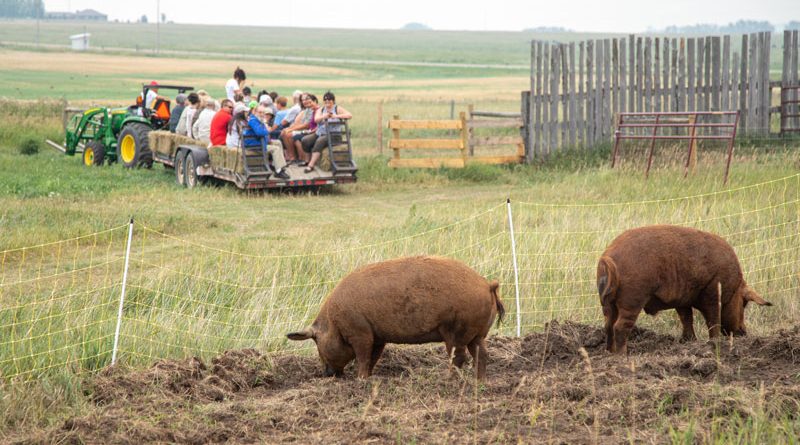Family raises rare pigs, celebrates with traditional Hungarian festival
By Miriam Ostermann, Associate Editor


Doug Taylor Photo
As a result, people often asked her whether she had any human children. While Stender is a mother of two, she is also the owner of more than 50 Hungarian heritage Mangalitsa pigs – a rare breed in Canada.
“I’ve loved pigs ever since I was little, so this is kind of my dream come true,” she said. “I raise them the best way, and for the breed to survive you need to eat it. To have it as a pet makes no sense. My goal is to make sure they have a happy life for the two years they’re with us and then we enjoy the meat. They have it pretty good and I do spoil them.”
Stender, who has a background in animal sciences from the University of Guelph, tasted the Mangalitsa meat at a restaurant in Calgary. Known for the world’s best charcuterie – salami and cured meat – she fell in love with the product. In 2016, EH Farms was born and in November of that year, Stender imported a 15-month-old first generation pregnant sow and a boar from California, whose parents had been imported from Hungary. Two years later, EH Farms – located northeast of Strathmore – is now housing over 50 Mangalitsa pigs, including a total of seven litters.
While the animals are purely raised for the meat, the family has a passion for keeping the Hungarian tradition thriving, thus resulting in Strathmore’s first traditional Hungarian Mangalitsa festival, PigStock2018, last weekend.
“I went to Budapest to meet some farmers and they had a big Mangalitsa festival and that’s why I am doing one here; I’m taking what I’ve learned there and doing a festival here,” Stender said.
Over 250 people attended the event Aug. 11, which included an outdoor farmer’s market, entertainment, corn on the cob, Hungarian folk dancing, a Hungarian exhibit, and a cookout competition with seven chefs from around Alberta. Calgary’s Italian restaurant, Bonterra Trattoria, which purchased half of EH Farm’s first butchered pig to use in their dishes, also sent their chef to participate in the festival.
The event provided the public a chance to see the pasture-raised hogs first-hand and to meet some of the litters that were born a few weeks ago.
In comparison to typical breeds that head to the butcher after six months, Mangalitsa pigs are raised for 24 months before leaving the farm. The meat differs in colour and texture – a dark red meat that’s rich in flavour with lots of omega 3, 6 and 9 fatty acids, that can cure for three years rather than six months.
Breeding of the Mangalitsa pigs began in 1800 in the Austro-Hungarian Empire, and was officially recognized in Europe in 1927. With the end of the Second World War, farmers who used the pigs for lard turned to oils, and in 1990 fewer than 200 Mangalitsa pigs remained in Hungary and Austria. Animal geneticist, Peter Toth, was credited for saving the breed from the brink of extinction nearly 30 years ago, with gilts and boars being exported to the United States, Australia, the Netherlands and to a handful of farmers in Canada. Mangalitsa pigs grow thick hair, dividing the pigs into three breeds: the blonde, the swallow-bellied that are black and white, and the reds.
Stender said when she found out no one in Canada was raising the red – the breed used to serve the Hungarian Empire – she veered from her original plan of just raising typical pigs to the Mangalitsa reds.
Her hands-on approach means Stender sets up her chair, blanket and pillow, and sleeps in the barn with a sow and her new litter until the babies are three days old and the risk of the mother squishing her babies has reduced. She’s also noticed her hands have turned into farm hands with hours spent rubbing the bellies of over 50 pigs. Her decision to feed by hand means it takes her over an hour to do the chores that normally require 20 minutes.
The family was overwhelmed at first with the rate at which their stock grew. They are planning to have their meat be a staple in various restaurants and hopefully become a local feature in Strathmore’s establishments.
With the success of PigStock2018, the Hungarian Canadian Cultural Association of Calgary, which bused nearly 200 people to the event from Calgary, has already voiced their interest in attending the event again next year.
